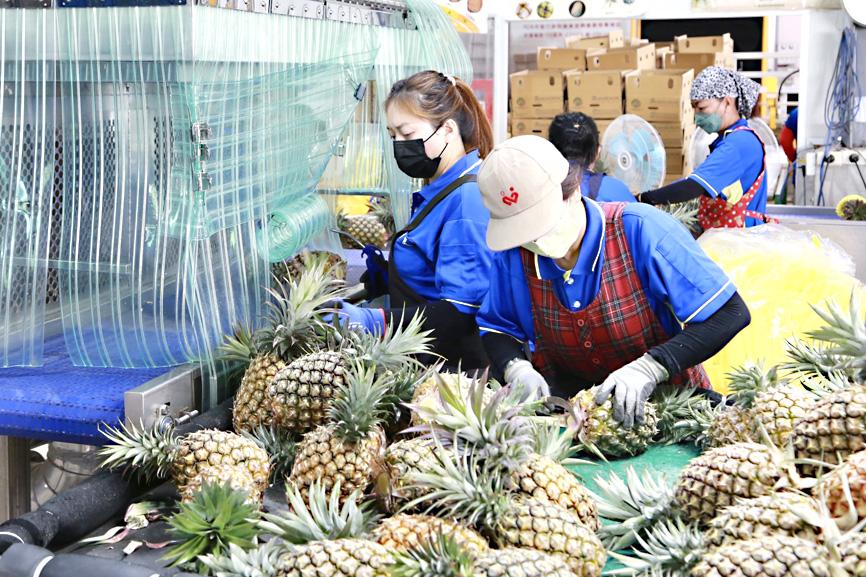Pineapple exports have so far this year risen more than 12 percent, showing that the industry has cast off reliance on the Chinese market following Beijing’s ban on imports of the fruit from Taiwan last year.
Exports of pineapples totaled 9,805 tonnes in the first three months, up 12.2 percent year-on-year, Council of Agriculture data showed.
This was despite the ban China imposed in March last year on imports of the tropical fruit from Taiwan, citing unspecified pests.

Photo: CNA
Council Minister Chen Chi-chung (陳吉仲) spoke alongside Tainan Mayor Huang Wei-che (黃偉哲) at a news conference in the city yesterday touting pineapple exports to Japan.
Ceremoniously closing a truck ready to ship nearly 14 tonnes of pineapples overseas, the officials thanked Japanese for their enthusiastic support of Taiwanese agriculture.
Even after China banned imports without warning, Taiwan’s growers found other markets with help from the council and the Agriculture and Food Agency, Huang said.
Although this year has seen a smaller export volume than during the same period last year, the quality is better, meaning that selling prices can be higher, he said.
The council last year acted quickly to promote local consumption and exports of pineapples, as well as the creation of value-added products, ensuring that growers did not feel the effects of China’s ban, the Tainan Agriculture Bureau said in a statement yesterday.
Taiwan last year exported a total of 28,000 tonnes of pineapples, council data showed.
Excluding exports to China, those bound for other markets increased by 533 percent from 2020.
Japan received nearly 18,000 tonnes, up 726 percent.
The council this year is still promoting pineapples to new markets, with the goal of increasing exports to 30,000 tonnes.
The council appears on track to achieve its goal, even without the Chinese market, the bureau said.
Successfully capturing the confidence of Japanese consumers also proves the quality of Taiwanese produce, as Japan imposes strict import quality and safety controls, the bureau added.

Taiwan has received more than US$70 million in royalties as of the end of last year from developing the F-16V jet as countries worldwide purchase or upgrade to this popular model, government and military officials said on Saturday. Taiwan funded the development of the F-16V jet and ended up the sole investor as other countries withdrew from the program. Now the F-16V is increasingly popular and countries must pay Taiwan a percentage in royalties when they purchase new F-16V aircraft or upgrade older F-16 models. The next five years are expected to be the peak for these royalties, with Taiwan potentially earning

STAY IN YOUR LANE: As the US and Israel attack Iran, the ministry has warned China not to overstep by including Taiwanese citizens in its evacuation orders The Ministry of Foreign Affairs (MOFA) yesterday rebuked a statement by China’s embassy in Israel that it would evacuate Taiwanese holders of Chinese travel documents from Israel amid the latter’s escalating conflict with Iran. Tensions have risen across the Middle East in the wake of US and Israeli airstrikes on Iran beginning Saturday. China subsequently issued an evacuation notice for its citizens. In a news release, the Chinese embassy in Israel said holders of “Taiwan compatriot permits (台胞證)” issued to Taiwanese nationals by Chinese authorities for travel to China — could register for evacuation to Egypt. In Taipei, the ministry yesterday said Taiwan

Taiwan is awaiting official notification from the US regarding the status of the Agreement on Reciprocal Trade (ART) after the US Supreme Court ruled US President Donald Trump's global tariffs unconstitutional. Speaking to reporters before a legislative hearing today, Premier Cho Jung-tai (卓榮泰) said that Taiwan's negotiation team remains focused on ensuring that the bilateral trade deal remains intact despite the legal challenge to Trump's tariff policy. "The US has pledged to notify its trade partners once the subsequent administrative and legal processes are finalized, and that certainly includes Taiwan," Cho said when asked about opposition parties’ doubts that the ART was

If China chose to invade Taiwan tomorrow, it would only have to sever three undersea fiber-optic cable clusters to cause a data blackout, Jason Hsu (許毓仁), a senior fellow at the Hudson Institute and former Chinese Nationalist Party (KMT) legislator, told a US security panel yesterday. In a Taiwan contingency, cable disruption would be one of the earliest preinvasion actions and the signal that escalation had begun, he said, adding that Taiwan’s current cable repair capabilities are insufficient. The US-China Economic and Security Review Commission (USCC) yesterday held a hearing on US-China Competition Under the Sea, with Hsu speaking on